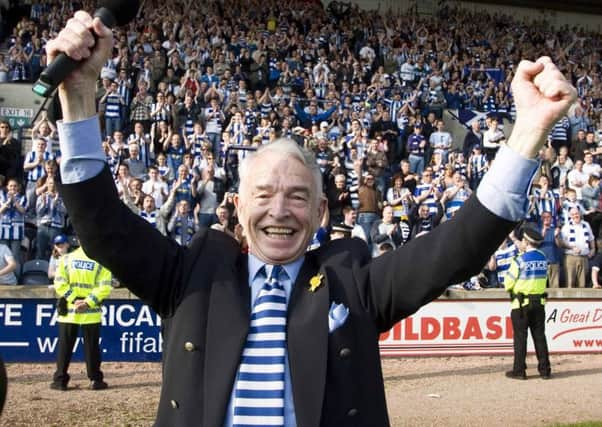Obituary: Douglas Rae, businessman and chairman of Greenock Morton football club


Douglas Rae, who has died aged 87, was a leading Scottish businessman well known to football fans as the long-serving chairman of Greenock Morton and the man who effectively rescued it from imminent extinction.
For almost 60 years he presided over one of the country’s largest confectionery companies, Golden Casket Ltd, which he set up in 1959 with capital of £100 and developed into an operation with a £25 million turnover employing more than200 staff.
Advertisement
Hide AdAdvertisement
Hide AdA football-daft youngster, he first stood on the terraces at Morton’s Cappielow ground as an eight year old alongside friend and fellow fan Arthur Montford, the well known television football commentator. That was the start of a lifelong love affair with his hometown club that never wavered and saw him step in to save it in 2001 when it was in serious danger of folding. His other sporting interest was golf, in which he held a number of administrative roles, becoming President of the Scottish Golf Union in 1993-94.
Born Duncan Douglas Foulds Rae in Greenock to David and Ellen, nee Foulds, he had two brothers, Thomas and Iain. His father ran a family printing business which his brothers joined, but after leaving Greenock Academy Mr Rae followed another path, entering the banking profession with the local North of Scotland Bank branch. National Service in the RAF soon followed, where he enjoyed the opportunities for football and golf.
At the same time he continued to study for banking examinations, which he passed after completing his service to become the youngest member of the Institute of Banking. His potential having been spotted, he was transferred to a post in the bank’s Stock Exchange division in Glasgow, which entailed a daily commute from Greenock. While working there he met colleague Adrienne, whose family name was also Rae, and the couple married in 1957, going on to enjoy some 60 happy years together, during which they had three children Alastair, Crawford and Gillian.
By the end of the decade he had become frustrated at his lack of professional progress which, combined with the effects of the grind of the daily commute and now having the responsibility of having to provide for a young family, led to his taking the plunge to go into business for himself. To the surprise of many, he set up Golden Casket Ltd, a confectionery company which he ran initially from the back of a van, distributing products to retailers throughout Scotland. His big break came in 1971 when, after hearing that one of his suppliers, the well established Fullers Ltd of York, might be sold to an American company, he stepped in to acquire it instead, which meant that his company was now a manufacturer as well as distributor and enjoyed a higher profile in the market. Subsequently he made further acquisitions including names such as Buchanan’s, Ferguson’s and Drysdale and Gibb, enabling him to market their well-known products.
By now he had acquired premises at Fort Matilda Industrial Estate in Greenock, the site of a former torpedo plant, which he transformed over several years into modern factory and warehouse premises which continue as the company’s base today. The success of the business has been built on adherence to traditional values with a readiness to innovate when appropriate. In 2011 he was delighted when Greenock Chamber of Commerce, as part of their Bees Knees Awards, gave him a Lifetime Achievement Award for his company’s success, stating: ”Golden Casket sits at the heart of the community.” A third generation of the family is now engaged, in it with Mr Rae having stood down as chairman last year.
Since first watching his beloved Morton, he became an annual season ticket holder and enjoyed recalling having watched his team in national cup finals and seeing English legends Stanley Matthews and Tommy Lawton play at Cappielow in Morton’s colours as guest players during wartime.
So fondly did these greats remember their time there that prior to one of those national finals, the 1948 Scottish Cup Final, they both sent good luck telegrams to the club. In 1988 Mr Rae joined the board as a director and remained until 1997, before regime change took place in the club.
This was a dark period in Morton’s history as its fortunes declined to the extent it was placed in administration and headed towards liquidation. As that fate was appearing inevitable, Mr. Rae stepped in at the 11th hour to save it. When he took over he committed to improving the dilapidated stadium, to making investment in players and management and to initiating a youth development programme, pledges which he fulfilled.
Advertisement
Hide AdAdvertisement
Hide AdHe continued as chairman and the club’s guiding force until standing down for health reasons in April. When he did so he expressed a warm tribute to the “wonderful” fans for their support and apologised for not being able to gain promotion to the Premiership. For him the highlight of his period at the helm was winning the old third division title in 2003, shortly after rescuing the club when 9,000 fans witnessed the win over Peterhead to clinch the flag. Another favourite memory was the 2013 League cup win against Celtic at Parkhead, the first time Morton had won there since 1971. Warren Hawke, former Morton player and now the club’s chief executive, praised Mr Rae ”for his charisma, passion and honesty”.
He was involved on a voluntary basis in golf administration for 30 years and in 1998 his services were recognised with a Torch Trust Trophy Award presented by the Duke of Kent. His faith was important to him and for many years he played an active role in his local Methodist Church while supporting a number of local charities. In 2016 he was appointed OBE for services to business and the community in Renfrewshire.
He is survived by his wife, children and ten grandchildren.
JACK DAVIDSON